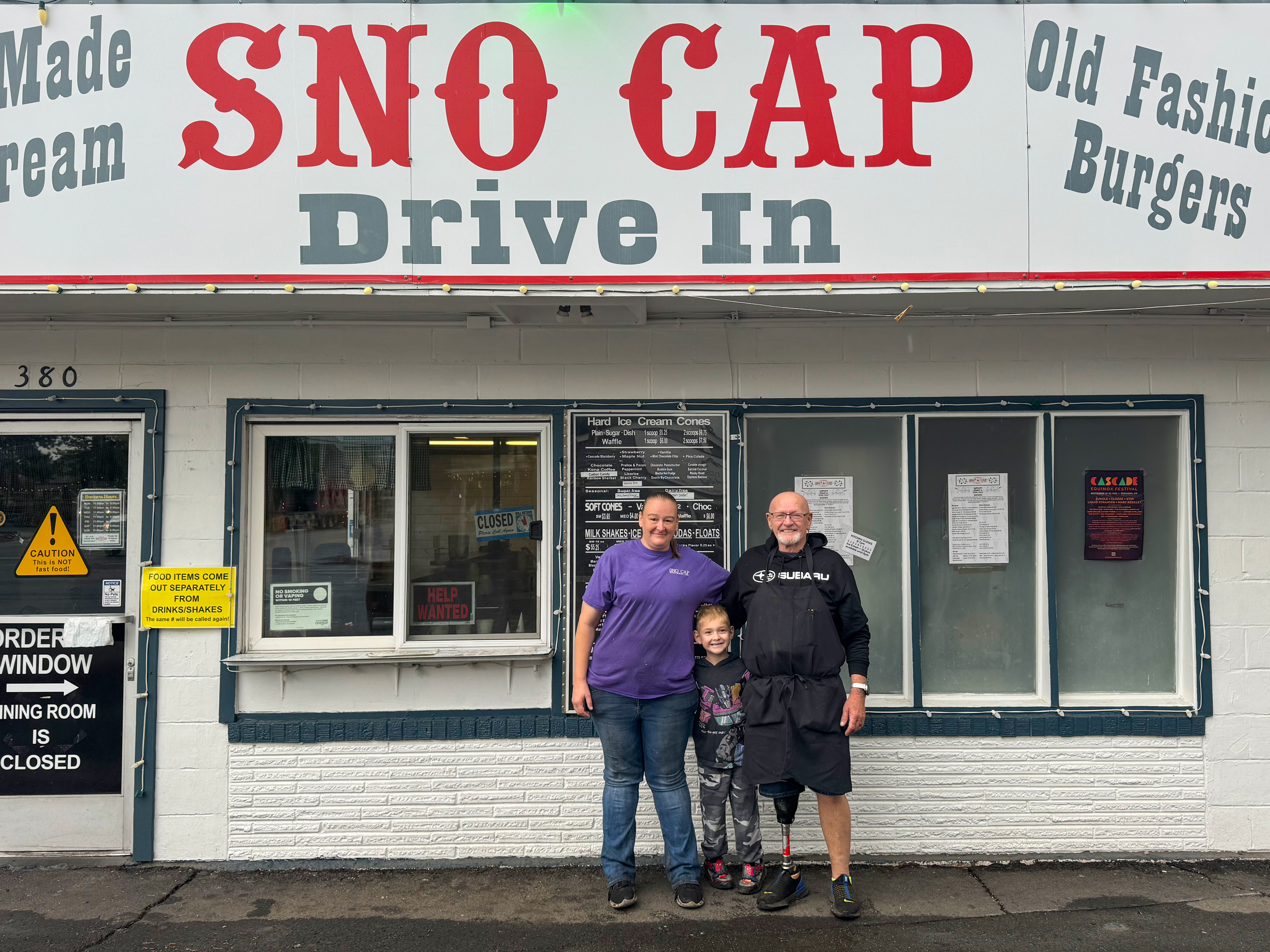
4 minute read
Keeping the line moving
By Bill Bartlett
Adrian and Buddy Blair work at Sno Cap. They live in the Deschutes National Forest. Upon first reading you might think that the two are entry-level line workers. To the contrary, Adrian is the manager and Buddy is… well you name it, and Buddy does it. Preps, cleans, fixes, stores, and helps keep the wheels turning.
Sno Cap is not a fast-food restaurant. Everything is cooked or served to order, from scratch. Most everybody in Sisters has at one time or another dined at Sno Cap. At a minimum, we’ve all observed the consistent long lines of town workers, tourists, entire sports teams, and other hungry folks displaying an uncanny loyalty to the eatery.
The iconic diner opened in 1982. The current owner, Lacey Weeks, is third generation. She grew up in Sisters and has spent a great deal of her life behind the counter. Over the decades, as is customary in such businesses, employees come and go.
Employee retention has always been a challenge for the restaurant industry. The industry ranks among the highest turnovers, with an average turnover rate in 2023 of about 74 percent. According to the Bureau of Labor Statistics, the quit rate in food service and accommodation is over five percent higher than in any other industry.
Weeks and her husband, Scott, consider themselves lucky to have the Blairs.
“They’re great workers,” Scott said. “Responsible. On time. Hard working. Very reliable, a hard thing to come by,” he adds.
Adrian and Buddy, who just celebrated their second wedding anniversary, find their employment as a perfect fit to their needs. Especially when it comes to raising their 6-year-old son, Elloey. Buddy can get in to the diner early, and get much of his work done in time to get Elloey to or from school.
Behind the scenes, it’s a beehive of activity. When the doors open it’s a crew of seven or eight. But hours before opening, Buddy and Adrian, working alone, have been slicing, dicing, chopping, and prepping for the crowds that will start lining up for the 11 a.m. opening.
They feel respected and appreciated by the Weeks.
“The customers are usually always wonderful,” Adrian said.
“The only problem is that they don’t always read the signs or instructions for ordering,” Buddy winks. “Or they get their heads into their phones, texting, and don’t always hear their order being called out.”
Any little disruption like that is a distraction, and break, in what is a well-oiled assembly line.
“We have to keep the line moving,” Adrian says.
Buddy is in his 60s and Adrian is upon 40. Their relationship began three years ago when Buddy joined the crew at Sno Cap where Adrian was already working. She’s now in her fifth year having worked every position.
Adrian has been around Sisters for most of her life. Her parents were owners of the original Ski Inn before a giant ponderosa fell in a high wind and took it out.
Like many a worker in Sisters, they cannot afford to live here. While they have been living in the forest for years now, they are getting closer to being able to have traditional housing in Madras. That’s how far they will need to go for affordable housing.
They plan to remain working at Sno Cap despite the commute.
Buddy’s a plumber by trade, but now his specialty is the famous fry sauce at Sno Cap, where he has figured out a way to streamline the making of it.
When asked if he could wave a magic wand and make being houseless more bearable, he was instant in his response: “Longer shower hours.” He’s referring to the two public showers in Village Green which are locked at 6 p.m. each night. “Sometimes we don’t get off until 7 p.m. or we have school stuff, so we miss out.”
Their two-axle trailer is small, yet they all manage.
“We have a big yard,” Buddy said with a grin.
They also have a storage locker in town where they have a few rooms of furnishings set aside for the day when they move out of the forest and into traditional housing.
You can’t help but notice Buddy’s prosthetic leg, a result of cancer at age 16. It’s no impediment to his getting the job done, which often requires being on ladders or in tight spaces.
He lived in traditional housing, a single-family home in Redmond, for 44 years with his previous wife. He’s known Sisters for his entire life, once having lived in The Pines, sub-standard housing back in the 1980s and ’90s that consisted of railroad cars taken off their wheels.
What strikes most who meet them and learn their story is their pride in their work and the fortitude they’ve shown in overcoming adversity.






